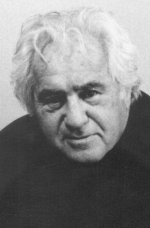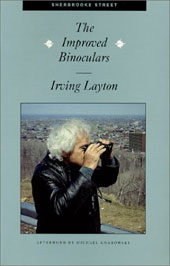The Porcupine's Quill
Celebrating forty years on the Main Street
of Erin Village, Wellington County
BOOKS IN PRINT
The Improved Binoculars by Irving Layton
The 87 poems included in the first (1956) edition of The Improved Binoculars were selected from the eight volumes the poet published in the first ten years of his career. The publication of the book -- simultaneously by The Ryerson Press (Canada), Migrant Books (England), and Jonathan Williams ( US ) -- did much to establish Layton as a major talent on the international poetry scene and prompted Robert Creeley to note: ‘Irving Layton may well be for the historian of Literature ... the First Great Canadian Poet.’
What a pleasure to rediscover ‘The Bull Calf’, ‘The Cold Green Element’, ‘The Birth of Tragedy’ and ‘To the Girls of my Graduating Class’ and discover these poems are as vital as the day they were written.
Review quote
‘The Improved Binoculars, a collection of poems from the first 10 years of Irving Layton’s long career, is the work of a writer who can be confrontational, bawdy, crass, and even romantic. This poet sees fidelity to the truth as much more important than decorum or good taste. Layton leaps from mythology to scatology in his extravagant -- but often rigidly formal -- poems, apologizing to no one for his fury or his libido. At their best, these poems are richly joyous, even in their darkest moments. At times, Layton’s poems do overshoot their mark with excessive or misdirected passion. But this is a necessary consequence of the poet’s audacity; there were not many overreachers writing in Canada in the 1950s.
‘The Improved Binoculars, published in 1956 by Jonathan Williams’s Jargon Press, was the first of Layton’s collections to be widely published in North America. Ryerson Press, the book’s Canadian distributor, refused to distribute the book (or even release it to the author) because of its ‘‘controversial’’ content. It is telling that Layton, whom we now regard as the author of some of the finest poems in Canadian history, found a warmer reception at first in the United States than he did in his own country. Layton’s early backers included Robert Creeley and William Carlos Williams, who provided a warm (but condescending -- he refers to Layton, a Montrealer, as a ‘‘backwoodsman’’) forward for The Improved Binoculars.’
‘Layton has published at least seven volumes of ‘‘Selected Poems’’ over the years, but The Improved Binoculars is still one of the best introductions to his work. Readers new to Layton will appreciate this slender collection’s size and be delighted with the scope and intensity of its contents.’
—amazon.ca
Author comments
‘The publication of The Improved Binoculars, in 1956 with an introduction by William Carlos Williams was a vitamin pill that restored my faith in mankind when the assaulting voices had become too loud and noisy. Invitations to give readings in the USA and to submit poems to American magazines and journals soon followed.
‘New Directions, some years later, published a Selected Poems with an introduction by Hugh Kenner. Not surprisingly, some of my fiercest and most raucous critics in Canada began to discover virtues in my work they had hitherto overlooked.
‘The chorus of disapproval that greeted my writing has abated somewhat but not entirely, I’m proud and happy to say. In a world of rapid change and dislocation it is indeed a comfort to know some things never change, some things are eternal: lousy taste, philistinism, smuggery and the vapourings of the half-alive.’
—Irving Layton, 1989
Unpublished endorsement
‘What else are you going to say about a man whose work you whole-heartedly admire than that he is a good poet? If you consider yourself a critic of poetry, which I do, all the more reason for speaking with all the force you can command in his support. You would be a fool to do less. When I first clapped eyes on the poems of Irving Layton, two years ago, I let out a yell of joy. He was bawdy but that wasn’t why I gave him my recognition. But for the way he greeted the world he was celebrating, head up, eyes propped wide, his gaze roving round a wide perimeter -- which merely happened to see some sights that had never been disclosed to me so nakedly or so well.’
—William Carlos Williams
Irving Layton (Israel Lazarovitch) was born March 12, 1912 in Tirgu Neamt, Romania. Layton came to Montreal with his family before he was one. He attained a BSc in agriculture at Macdonald College in 1939. Following a stint in the Canadian Army, he did graduate work in political science at McGill. A poet, short-story writer, and essayist, Layton is perhaps the most well-known of the Montreal poets, a group of young poets who engaged in a battle against romanticism in poetry in the 1940’s. Layton has published many poetry collections, including A Red Carpet for the Sun (1959) which won the Governor General’s Award. Layton was poet-in-residence at various Canadian universities and a professor of English at York University 1969-78. He was nominated for the Nobel Prize in 1981.
Irving Layton died in 2006.
The Porcupine's Quill would like to acknowledge the support of the Ontario Arts Council and the Canada Council for the Arts for our publishing program. The financial support of the Government of Canada through the Canada Book Fund (CBF) is also gratefully acknowledged.





